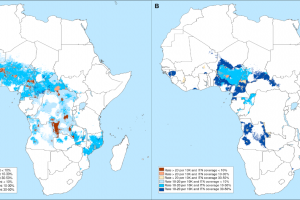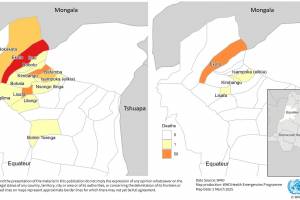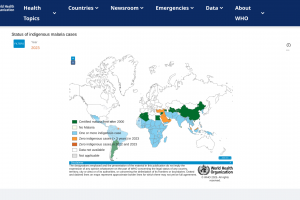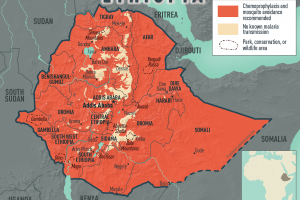Malaria Vaccines
Malaria Vaccines 2025
The World Health Organization (WHO) recommends the programmatic use of malaria vaccines to prevent P. falciparum malaria in children living in malaria-endemic areas. As of March 18, 2025, the WHO and the European Medicines Agency (EMA) recommend Mosquirix™ and R21 / Matrix-M™ vaccines for travelers visiting malaria-endemic countries. These malaria vaccines were added to the WHO list of prequalified vaccines in 2024. As of 2025, 17 countries have introduced malaria vaccines through routine immunization targeting children.
The WHO's World Malaria Report 2024 estimates the annual global demand for malaria vaccines at 40–60 million doses by 2026 and 80–100 million doses annually by 2030. In November 2024, the WHO published a revised version of the consolidated Guidelines for malaria with an updated vaccine recommendation. People can be tested for malaria infection at commercially labs in the U.S.
Malaria Vaccines Approved
Mosquirix™ RTS, S/AS01 malaria vaccine. Mosquirix is a recombinant vaccine of the P. falciparum circumsporozoite protein from the pre-erythrocytic stage.
R21/Matrix-M™ Serum Institute of India's malaria vaccine was designed in 2011 and co-produced by scientists at the University of Oxford, Novavax AB, and Novavax Inc.
As of March 18, 2025, the U.S. Food and Drug Administration had not approved a malaria vaccine.
Malaria Vaccine Candidates 2025
RH5.1/Matrix-M malaria vaccine developed at the University of Oxford targets blood-stage malaria, unlike previously approved malaria vaccines that target the pre-erythrocyte stage. The results of the phase 2b trial by Natama and colleagues indicated that RH5.1/Matrix-M had a vaccine efficacy of 55% (95% CI 20 to 75; p=0·0071) when administered at 0, 1, and 5-month intervals. On December 10, 2024, and February 2025, researchers wrote, 'RH5.1/Matrix-M appears safe and highly immunogenic in African children and shows promising efficacy against clinical malaria when given in a delayed third-dose regimen.'
Sanaria Inc.'s non-replicating whole parasite PfSPZ vaccine candidate is made with a live-attenuated form of the malaria parasite Plasmodium falciparum sporozoite. Clinical studies have been shown to provide about 90% protection in a challenging clinical trial. On August 14, 2024, The Lancet published clinical trial results showing that PfSPZ vaccination without presumptive antimalarial treatment before the first vaccine dose did not show efficacy. In the preconception trial, a related editorial, researchers speculated that the PfSPZ vaccination might avert malaria-related early pregnancy losses since parasitemia risk during the periconception period was reduced by 65 to 86%.
The Lancet Infectious Disease published in July 2023 results from a phase 1 study evaluating the effectiveness of the Gamete vaccine Pfs230D1-EPA/Alhydrogel to zygote vaccine Pfs25-EPA/Alhydrogel. Pfs230D1, but not the Pfs25 vaccine, induces durable serum functional activity in Malian adults.
Versatope Therapeutics Inc. is developing a bi-specific malaria vaccine using a target that blocks the initial malaria infection and transmission.
In a phase 1 study, the ProC6C-AlOH/Matrix-M vaccine candidate elicited the highest levels of functional antibodies, meriting further investigation.
BNT165e mRNA Malaria Vaccine candidate—BioNTech is developing the first malaria vaccine based on mRNA technology to eradicate mosquito-borne illness. The phase 1 clinical trial will evaluate the safety, tolerability, and exploratory immunogenicity of the 3-dose vaccine candidate. In March 2025, the U.S. FDA placed a clinical hold on the phase 1/2a study. BioNTech's Malaria project was first announced in July 2021.
Ocean Biomedical has been awarded a new patent for a parasite target called PfCDPK-5. This target could potentially prevent the parasite at multiple stages in the malaria cycle in a multivalent mRNA-based malaria vaccine. In addition, recent studies in Nature identified PfGARP as a target of human antibodies that kill up to 100% of parasites in vitro.
AgTRIO mRNA-lipid nanoparticle was assessed for its potential usefulness as a vaccine against malaria.
repRNA Malaria Vaccine Technology
In January 2025, MalarVx, Inc. licensed HDT Bio's proprietary self-amplifying replicon RNA (repRNA) and lipid nanoparticle (LION™) technologies for use in malaria vaccines. MalarVx has also demonstrated the potential of LION-based vaccines to prevent infections caused by Plasmodium parasites, the pathogens responsible for malaria in humans and other animals.
Malaria Monoclonal Antibody Passive Immunization
The New England Journal of Medicine published results from a phase 2 study on April 26, 2024. The study demonstrated that a single subcutaneous injection of the NIAID's experimental L9LS (VRC-MALMAB0114-00-AB) malaria monoclonal antibody offered up to 77% protection against P. falciparum infection and clinical malaria over six months. According to the study authors, "the data from our trial support the administration of a single dose of L9LS to school-aged children before the malaria season."
The Phase 2 NIAID-USTTB evaluated the safety and efficacy of a one-time, intravenous infusion of a monoclonal antibody called VRC-MALMAB0100-00-AB (CIS43LS). The antibody was up to 88.2% effective at preventing infection over 24 weeks, demonstrating for the first time that a monoclonal antibody can prevent malaria infection in an endemic region. This antibody was previously shown to neutralize the sporozoites of P. falciparum in the skin and blood before they could infect liver cells.
Malaria Treatments
The 2024 World Malaria Report revealed a concerning trend: the global malaria incidence rate was 58.6 cases per 1000 people at risk in 2023. Various antimalarial treatments were approved by the U.S. CDC in 2025.





